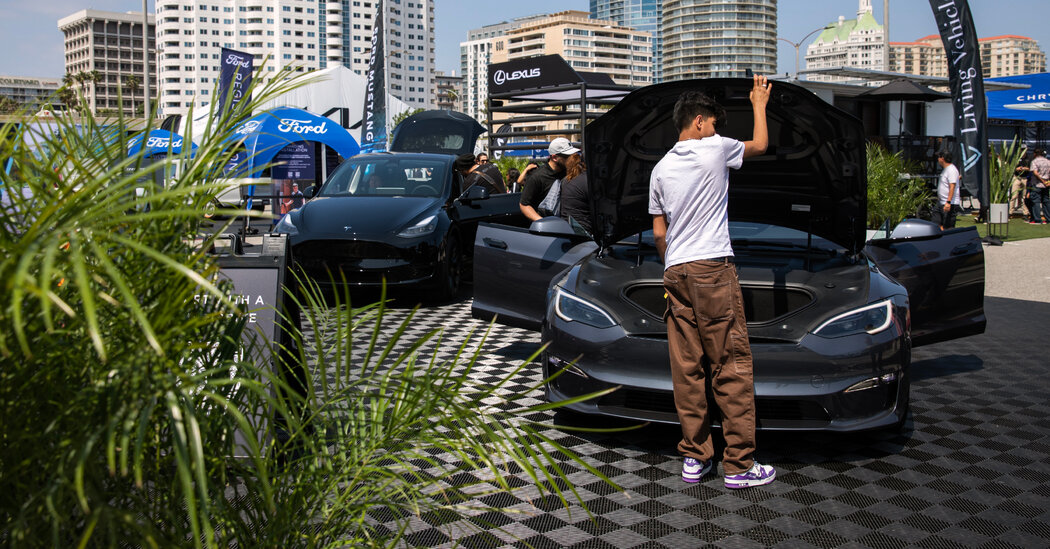Tesla reported a second-quarter profit increase after the company, led by Elon Musk, slashed prices in response to increased competition and higher borrowing costs for car buyers.
The company said Wednesday it earned $2.7 billion from April to June, up from $2.5 billion in the first quarter of this year and $2.3 billion in the second quarter of 2022. Revenue rose 7 percent to $25 billion from the first quarter.
Lower average selling prices, as well as the cost of producing a new pickup, weighed on earnings, Tesla said.
Tesla may need to lower prices further, Musk said, noting that higher interest rates make it harder for people to afford new cars.
“We have no control over macroeconomic conditions,” he said on a conference call with analysts and investors. “If macroeconomic conditions are stable, prices will remain stable. If macroeconomic conditions are not stable, we should lower prices.”
Tesla shares fell about 4 percent in extended trading on Wednesday.
A deepening price war is making EVs more affordable, but it’s hurting profits across the industry. Wait times for vehicle delivery have evaporated, and dealers who sold cars at hefty surcharges a year ago are now offering discounts of thousands of dollars.
Tesla is one of the few companies that makes money from electric vehicles and dominates the US and European electric car market. This puts the company in a stronger position than other automakers that lose billions of dollars on electric cars.
But Tesla has had to cut prices sharply to lure buyers and defend its market share, resulting in a lower profit margin on car sales. The company made 59 percent of electric cars sold in the United States in the second quarter, up from 65 percent a year earlier, according to Kelley Blue Book.
The coming year could determine whether Tesla maintains its dominance. The company said last week it had begun production of the Cybertruck, a futuristic-looking pickup that will go on sale by the end of the year and enter one of the most popular and lucrative segments of the US auto market. The Cybertruck will be Tesla’s first new passenger model since the Model Y in 2020.
Unlike the Model Y, an SUV that had little competition when it went on sale, the Cybertruck is entering a crowded field. Ford Motor offers an electric pickup, the F-150 Lightning, and Rivian, a fledgling automaker, sells one called the R1T. General Motors will soon begin selling an electric version of its Chevrolet Silverado pickup.
Indicative of the increasing competition, Ford said Monday it would lower the price of the Lightning by up to $10,000.
Ford said the price cuts were possible because it ramped up assembly lines to produce more trucks and because the price of battery raw materials had fallen. But analysts said the cuts reflected a glut of electric vehicles. Ford could also try to gain market share before the Cybertruck and electric Silverado become available in significant numbers.
Rivian is also becoming a more formidable competitor after reportedly overcoming production problems. The R1T pickup outsold the electric F-150 in the first six months of the year.
RJ Scaringe, CEO of Rivian, acknowledged in an interview last month that establishing a smooth manufacturing operation was “definitely challenging.” But he added: “We’ve sort of passed that point of peak pain and are now in this sort of much more predictable phase of disaster.”
In Europe, Tesla is closing in on established automakers like Fiat by ramping up production at a plant near Berlin and planning a major expansion of that plant. But Tesla also faces increasing competition in Europe from Chinese automakers such as BYD and SAIC, which sell electric cars under the MG brand. In China, Tesla has had to cut prices to face competition from domestic automakers with newer models.
And all automakers are facing rising interest rates, driving up monthly loan payments for car buyers. Some banks are no longer willing to lend to borrowers with weaker credit histories.
Tesla also sells solar panels and batteries for home and electricity storage. The company’s fans often cite those companies as underappreciated sources of growth.

